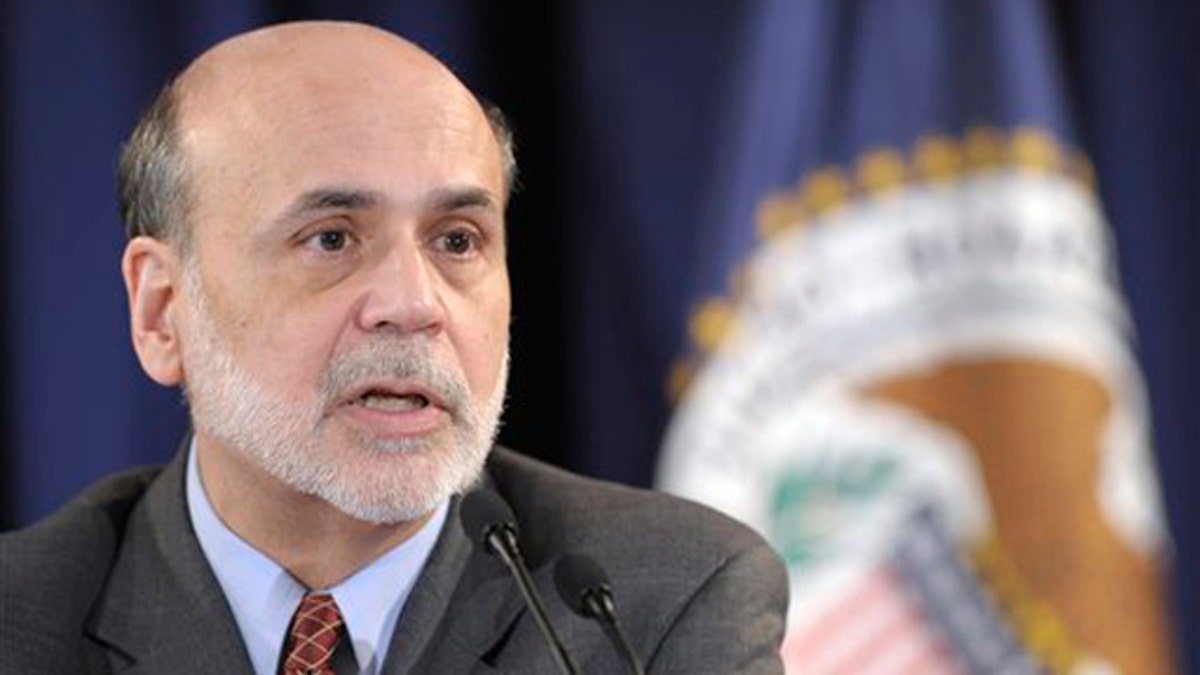
Federal Reserve Chairman Ben Bernanke speaks during a news conference at the Federal Reserve in Washington April 27. (AP)
Ben Bernanke, making history as the first Federal Reserve chairman to hold a news conference, said Wednesday that he hopes the decision by a major credit ratings agency to lower the U.S. debt outlook "goads" Washington into addressing its deficit. He described the deficit as "the most important economic problem" facing the country in the long term.
The Fed chairman was referring to Standard & Poor's recent move to downgrade the U.S. fiscal outlook from stable to "negative." Bernanke noted that the announcement "didn't really tell us anything," since the federal government's fiscal problem is widely recognized. But he said the downgrade could be "constructive."
"I'm hopeful that this event will provide at least one more incentive for Congress and the administration to address this problem," Bernanke said. "If it's not addressed, it will have significant consequences for financial stability, for economic growth, for our standard of living."
He said it is "of the highest importance" that political leaders act quickly.
The S&P rating was just one of many topics Bernanke addressed as he took question after question from reporters. Though the Fed has long been one of Washington's most secretive institutions, Bernanke is looking to hold three news conferences this year as part of his effort to make the central bank more open and publicly accessible.
He also discussed the Fed's stimulus-style policies and the remaining challenges in laying the groundwork for a speedier recovery.
Among those challenges is the price of gas, topping $4 a gallon in many cities. Asked about the concern, Bernanke warned Wednesday that high gas prices could trigger "broader inflation" in the economy which would be "much more difficult to extinguish."
However, he expressed confidence in the likelihood of those costs stabilizing or falling.
"Our view is that gas prices will not continue to rise at the recent pace," Bernanke said.
The chairman acknowledged repeatedly that the economic recovery has been "relatively slow." Reflecting that, he unveiled the latest Fed economic outlook showing the economy growing between 3.1 percent and 3.3 percent this year.
That's a downward revision from their last forecast, which saw growth possibly as high as 3.9 percent this year. Bernanke said that rate could rise to as high as 4.2 percent in 2012 and 2013.
Meanwhile, he said the unemployment rate should edge down to between 8.4 and 8.7 percent at the end of 2011, and potentially fall below 7 percent by the end of 2013.
After the press conference, Bernanke's toughest congressional critic indicated he was not impressed by the chairman's performance. Rep. Ron Paul, R-Texas, said Bernanke offered "no substantive information" and continued to blame Federal Reserve intervention for the country's economic woes.
"Mr. Bernanke continues to ignore his culpability for the inflation all Americans suffer due to the Fed's relentless monetary expansion. Rising prices are the direct result of Fed devaluation of our dollar. Yet rather than addressing the Fed's loose dollar policy, Mr. Bernanke continues to assure us that inflation is not a problem," Paul said in a statement, warning that Fed policy could destroy the currency. "Today's staged press conference will not be enough to stop the growing demand for real Fed transparency."
Ahead of Bernanke's appearance, the Federal Reserve signaled that its $600 billion Treasury bond-buying program will end in June as planned because the economy has strengthened and companies are starting to hire more. The Fed, in a unanimous decision, made no changes to the program. The Fed said it will continue a separate support program to reinvest about $17 billion a month in proceeds from its portfolio of mortgage securities to buy Treasury debt.
The Fed chairman later said any additional steps by the Fed to try to lower unemployment might raise other risks, such as higher inflation. If inflation were to accelerate, it could then reduce employment. That's because the Fed would have to raise rates to reduce price increases.
Bernanke said the first step in tightening interest-rate policy could occur when the Fed stops reinvesting the proceeds of its bond holdings. Bernanke would not be specific about when that might occur. He said it will depend on inflation and economic growth in coming months.
He said that step would be a relatively modest one. But it would constitute the Fed's first tightening because it would allow interest rates to creep up.
Under Bernanke, the Fed's policies have run into criticism from some of the Fed's own regional bank presidents. They say the central bank should stop trying to stimulate growth -- through a process called "quantitative easing," which means creating more dollars to push into banks to lend -- and start fighting inflation by raising interest rates from super-low levels before the year ends.
They point to the run-up in gasoline and food prices. Higher interest rates could slow spending and make inflation less likely.
Bernanke and a majority of Fed officials counter that those higher prices are temporary and, apart from energy and food, won't lead to substantially higher prices overall.
To prepare for the press conference, Bernanke has watched tapes of how his counterparts in Europe -- Jean-Claude Trichet, president of the European Central Bank and Mervyn King, head of the Bank of England -- have performed at news conferences. Two months ago at a meeting of finance officials in Paris, Bernanke pulled aside Trichet and King to quiz them on how they manage their encounters with reporters.
The Associated Press contributed to this report.




